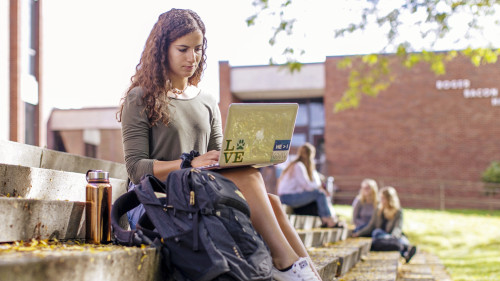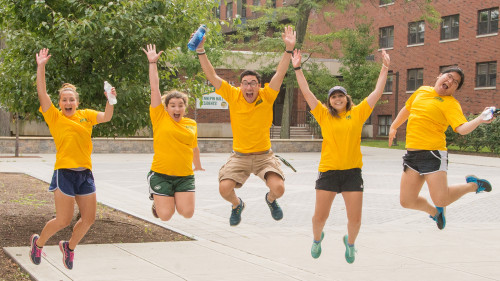The Effect of Gut Microbiota on Malaria: Q&A with Veda, a Siena Research Student
Colleges talk a lot about research. Students conducting research with professors, presenting research at conferences, writing research conclusion papers. But what does all that actually mean? If you’re like most high school students, probably not much, and that’s okay. We’re starting a new series on this blog to demystify the elusive concept of research—and trust us, it’s fascinating.
Follow along as we interview a few of Siena’s summer research students on their projects, what they’re literally doing when they’re “researching” and why, although you may not know it now, doing research in college can be the linchpin that secures you the job of your dreams.
First up: we’re talking about gut microbiota. Stay with us.
Meet Veda Chandwani, rising sophomore
Hailing from Sharon, Massachusetts, Veda just finished her freshman year at Siena, and to say this biology major kept busy is an understatement. Treasurer of the Inspire club, dancer on the Bollywood team, member of the Bus Stop Club and several other organizations, Veda is spending part of this summer in our Roger Bacon building working on a mission that could quite literally change lives.
Before we get into your research, how did you come to sign on for this project?
One of my professors told my class that another math professor, Scott Greenhalgh, was working on several research projects in case any of us were interested in getting involved. I emailed Professor Greenhalgh, and after answering a few questions, we met in person and here I am. He’s working on four projects—one on HIV, one on computer use in schools, one on fish farming, and the one I’m on, gut microbiota. It was all very casual. He asked what courses I’ve taken and if I’ve ever coded (I hadn’t, until now), and that was it!
Gut microbiota and its effect on malaria. Explain your project!
In Sub-Saharan Africa, there are roughly 200 million cases of malaria every year, and they spend about $4 billion a year trying to treat it through meds like malaria pills or chemotherapy. We’re trying to figure out a more cost-effective way through gut microbiota.
Gut microbiota is a complex community of bacteria inside our gut—which can be positively impacted by the good bacteria that’s found in yogurt. So, we’re looking at the good bacteria that settles in your gut when you eat yogurt. We’re using dry yogurt in our research.
Scientists have already discovered that this is helpful in reducing severe malaria. What we’re doing is a cost-effective analysis based on previous studies to help public health policy makers determine if they should actually distribute dry yogurt to Sub-Saharan African—to reduce severe malaria cases and cut down on their spending.
So what are you literally doing when you’re working on this project?
We started by reading published papers and then I took that information to make a mathematical model that connects all the phases of malaria, so we can see how someone moves forward through the stages: susceptible, infected, recovered. But, it’s a lot more complicated than that!
Now we’re trying to run simulations. So, I’m saying, if this percent of the population was given dry yogurt, how much would it cost? What effect would it have? Is that cost-effective? And I’m doing that with multiple percents of the population to see which is the most cost-effective route.
How’s your experience been so far? What have you learned about yourself, or what skills have you picked up?
I know more about how to code. I think I’ve become better at socializing with my peers—just because I spend so much time with the same few people in a small space. I’m getting my own paper published, so that’s great for my resume. I’ve never done research before and never even considered researching in high school, but I would absolutely encourage incoming college students to take the opportunity. And that’s definitely easier to do at Siena. Because we’re a smaller school and there are few graduate students, we all have the opportunity to do research and build our resumes earlier on.
The best part is that I feel like I’m making some sort of a difference in the world. Even from my little spot in New York. I’m helping somebody make a decision that could affect the lives of so many people in a completely different country, that doesn’t have the same resources we do.
Now that’s rewarding. Back to the basics: what made you choose Siena?
Probably the community service aspect. I spent thousands of hours in high school on community service, and I also want to go into medicine. My guidance counselor recommended I apply to Siena’s eight-year med program. I’m thinking I want to be a child neurologist, but I’m not totally sure yet.
Would you recommend Siena to high school students interested in math and science?
Definitely. I think our math and science departments are really strong. I think our science professors are some of the best professors I’ve taken class with. And I just love the feel of the school. Everyone’s so friendly.
Veda, you’re amazing. Thank you for chatting with us!
For more information on Siena College, sign up to receive our emails now.


